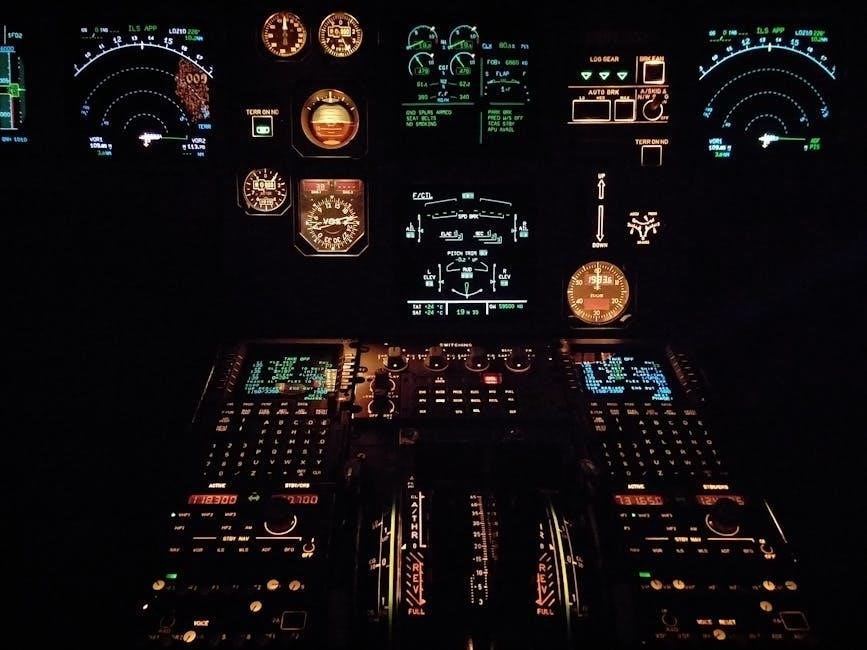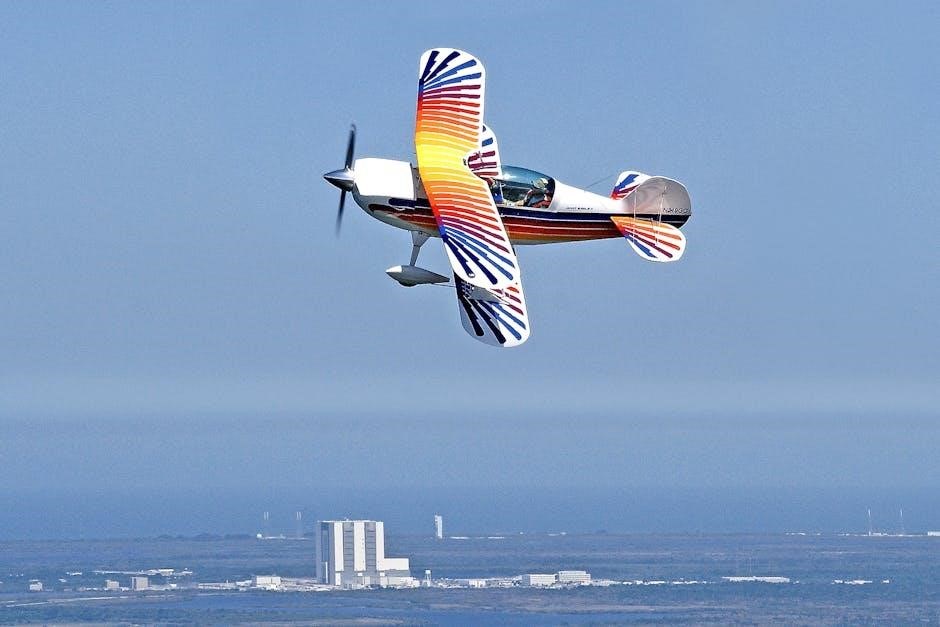The Delta Pilot Contract, also known as the Pilot Working Agreement (PWA), outlines the terms and conditions for Delta Air Lines pilots, governing pay, benefits, and career progression. This legally binding document ensures fairness and clarity for both pilots and the airline, reflecting industry standards and collective bargaining efforts.
1.1 Overview of the Delta Pilot Contract PDF
The Delta Pilot Contract PDF is a comprehensive document detailing the terms of the Pilot Working Agreement (PWA) between Delta Air Lines and its pilots. It outlines pay scales, benefits, work rules, and career progression, serving as a reference for both pilots and management. Regularly updated, the PDF is accessible online, optimized for easy viewing on various devices, ensuring transparency and clarity for all stakeholders involved.
1.2 Importance of the Contract for Pilots and the Airline
The Delta Pilot Contract is crucial for pilots, ensuring fair compensation, benefits, and work conditions, while providing career growth opportunities. For the airline, it establishes operational stability, attracting and retaining skilled pilots. The agreement aligns with industry standards and reflects the collaborative efforts of Delta and the Air Line Pilots Association (ALPA), fostering a balanced relationship between pilot well-being and airline efficiency.

History of the Delta Pilot Contract
The Delta Pilot Contract has evolved significantly over the years, reflecting changing industry standards and negotiation outcomes, shaping pilot compensation, benefits, and career progression.
2.1 Evolution of the Contract Over the Years
The Delta Pilot Contract has undergone numerous revisions, adapting to industry changes, technological advancements, and shifting workforce needs. Over the years, it has incorporated improved pay scales, enhanced benefits, and clearer career progression pathways, ensuring alignment with modern aviation standards and pilot expectations. These updates reflect the dynamic nature of the aviation industry and the collaborative efforts between Delta and its pilots.
2.2 Key Milestones in the Negotiation Process
The negotiation process for the Delta Pilot Contract has included several pivotal moments, such as the 2023 tentative agreement and subsequent ratification by pilots. This deal introduced significant pay raises and benefit enhancements, marking a milestone in pilot compensation. The process also highlighted the role of the Air Line Pilots Association (ALPA) in advocating for pilot interests, ensuring the contract aligns with industry standards and pilot expectations.

Key Provisions of the Delta Pilot Contract
The Delta Pilot Contract includes significant pay raises, enhanced benefits, and improved work schedules. It also outlines career progression opportunities and training requirements, ensuring pilots’ professional growth and well-being while maintaining operational efficiency for the airline.
3.1 Pay Raises and Benefits for Pilots
The Delta Pilot Contract includes substantial pay raises and enhanced benefits, with cumulative increases exceeding $7 billion over four years. Pilots receive immediate raises of nearly 13% and additional 3% annual increases. Benefits such as disability coverage, maternity leave, and health insurance are also improved, ensuring comprehensive support for pilots and their families. These provisions aim to maintain competitive compensation and reflect Delta’s commitment to pilot well-being and career satisfaction.
3.2 Work Schedules and Rest Periods
The Delta Pilot Contract establishes structured work schedules and rest periods to ensure pilot well-being and safety. Pilots receive advance notice of reserve assignments, with minimum rest periods of 10 to 14 hours, depending on duty duration. Fatigue management is prioritized, aligning with industry standards. The agreement also includes provisions for vacation, sick leave, and rotation adjustments, promoting a balanced work-life environment for pilots.
3.3 Career Progression and Advancement Opportunities
The Delta Pilot Contract includes provisions to support career growth, offering clear pathways for advancement from first officer to captain. Pilots benefit from training programs and seniority-based promotions. The agreement also outlines opportunities for upgrading aircraft types and leadership roles, ensuring long-term professional development. This structure incentivizes experience and performance, fostering a motivated and skilled pilot workforce within the airline.

The Ratification Process
The Delta Pilot Contract ratification involves a vote by ALPA members, ensuring pilots approve the agreement. The process is crucial for finalizing the contract terms.
4.1 Pilot Union’s Role in Contract Negotiation
The Air Line Pilots Association (ALPA) plays a pivotal role in negotiating the Delta Pilot Contract. ALPA represents pilots’ interests, ensuring fair compensation, benefits, and working conditions. Through collective bargaining, ALPA advocates for pilots’ rights, collaborating with Delta to reach mutually beneficial agreements. Their involvement is crucial in resolving disputes and securing a contract that aligns with industry standards, benefiting both pilots and the airline’s operations.
4.2 Pilot Voting and Approval Process
The Delta Pilot Contract undergoes a rigorous ratification process, where pilots vote on the proposed agreement. ALPA ensures transparency by providing detailed information to members. A majority vote is required for approval. Once ratified, the contract becomes effective, governing pilots’ terms. This democratic process ensures pilots’ collective agreement, reflecting their support for the negotiated terms and benefits outlined in the contract.
Career Progression for Pilots
The Delta Pilot Contract outlines a structured career progression program, including a clear pathway for Endeavor pilots to transition to Delta, with opportunities for advancement and seniority-based promotions, ensuring a defined trajectory for professional growth and development within the airline.
5.1 Pathways for Advancement Within Delta
The Delta Pilot Contract provides a structured pathway for advancement, enabling pilots to progress from first officer to captain, with opportunities for leadership roles and specialized positions. The agreement ensures merit-based promotions, seniority considerations, and training programs, fostering a clear and fair career trajectory within the airline, as outlined in the Pilot Working Agreement.
5;2 Training and Certification Requirements
The Delta Pilot Contract mandates comprehensive training and certification requirements to ensure pilots meet federal aviation regulations and airline standards. Recurrent training, ATP certification, and type ratings are essential. Pilots must complete periodic checks and adhere to Delta’s training programs, which include simulator sessions and ground school. These requirements ensure operational safety and maintain the high standards expected of Delta pilots, supporting their professional development and compliance with industry regulations.

Benefits and Leave Policies
The Delta Pilot Contract includes comprehensive benefits such as health insurance, disability coverage, and maternity/paternity leave. Pilots receive robust medical benefits and paid time off, enhancing work-life balance and overall well-being.
6.1 Health and Disability Benefits
The Delta Pilot Contract provides extensive health and disability benefits, ensuring pilots receive comprehensive medical coverage. Disability benefits offer financial support for up to 26 weeks due to injury, sickness, or pregnancy. These provisions aim to protect pilots’ well-being and provide security during periods of medical leave, ensuring they can recover without financial strain.
6.2 Maternity and Paternity Leave Provisions
The Delta Pilot Contract includes supportive policies for new parents, offering maternity and paternity leave provisions. Pilots receive temporary disability benefits for up to 26 weeks during pregnancy or childbirth. Additionally, Delta provides paid leave options for both mothers and fathers, ensuring work-life balance and family well-being. These provisions align with industry standards and reflect Delta’s commitment to supporting pilots during significant life events.

The Negotiation Process
The negotiation process for the Delta Pilot Contract involves detailed discussions between Delta Air Lines and the pilots’ union, aiming to reach a mutually beneficial agreement. Mediators often assist in resolving disputes, ensuring fair terms for compensation, benefits, and working conditions. The process is crucial for maintaining pilot satisfaction and operational efficiency.
7.1 Challenges in Reaching an Agreement
Reaching an agreement on the Delta Pilot Contract faces challenges such as conflicting demands on pay, benefits, and work schedules. Pilots seek higher compensation and better rest periods, while the airline aims to balance costs with profitability. Additionally, complex seniority systems and furlough protections create negotiation hurdles. Mediators play a key role in bridging these gaps to achieve a fair and sustainable contract for both parties.
7.2 Role of Mediators and Negotiation Tactics
Mediators play a crucial role in facilitating constructive dialogue between Delta and its pilots, ensuring negotiations remain focused and productive. They employ tactics such as neutral third-party interventions and creative problem-solving to address disputes. By fostering trust and open communication, mediators help both sides reach mutually beneficial agreements, balancing pilot demands with airline operational needs for a fair and sustainable contract outcome.

Industry Impact of the Delta Pilot Contract
The Delta Pilot Contract sets a benchmark for the aviation industry, influencing other airlines and unions in negotiations over pilot compensation, benefits, and working conditions nationwide.
8.1 Influence on Other Airlines and Unions
The Delta Pilot Contract significantly impacts the aviation industry, setting a precedent for pilot compensation and benefits. Other airlines and unions closely monitor the agreement, as its terms often influence their own negotiations. For instance, United Airlines’ CEO noted that Delta’s contract could establish an industry pattern. The deal’s focus on pay raises, work conditions, and career progression encourages other unions to push for similar improvements, shaping broader industry standards.
8.2 Industry-wide Implications for Pilot Compensation
The Delta Pilot Contract sets a benchmark for pilot compensation, influencing industry-wide standards. Its significant pay raises and enhanced benefits create pressure for other airlines to offer competitive packages. This trend encourages unions to negotiate similar terms, potentially raising pilot wages across the aviation sector. The agreement’s focus on fair compensation and improved working conditions underscores its role in shaping future pilot contracts industry-wide.

Accessing the Delta Pilot Contract PDF
The Delta Pilot Contract PDF is available on official sources like Delta Air Lines’ website and the Air Line Pilots Association (ALPA) portal for easy download and review.
9.1 Official Sources for the Contract Document
The Delta Pilot Contract PDF can be accessed through official channels, including Delta Air Lines’ internal website and the Air Line Pilots Association (ALPA) portal. These sources ensure authenticity and provide the most up-to-date version of the agreement. Additionally, the contract document is often shared via secure links during union communications or through designated employee platforms, ensuring accessibility for all eligible pilots.
9.2 How to Download and Review the PDF
To access the Delta Pilot Contract PDF, visit the official Delta Air Lines or ALPA websites. Log in to your secure portal, navigate to the contracts section, and search for the document. Click the download link to save the PDF. Use a PDF reader to open and review the file, ensuring you understand all terms, benefits, and policies outlined in the agreement. Regularly check for updates to stay informed about any changes.
Seniority and Furlough Policies
Delta’s seniority system determines pilots’ rights and protections, while furlough policies include safeguards like 90-day notices and recall procedures to ensure fair treatment during workforce reductions.
10.1 Seniority System and Its Impact on Pilots
The Delta Pilot Contract establishes a seniority system based on a pilot’s hire date, determining their priority for scheduling, promotions, and furlough protections; Seniority significantly impacts pilots’ job security and career advancement, with more senior pilots enjoying greater privileges in route selection and leave. The contract also ensures that pilots receive at least 90 days’ notice before any furlough, providing stability and predictability in uncertain times.
10.2 Furlough Protections and Procedures
The Delta Pilot Contract includes robust furlough protections, ensuring pilots receive a minimum of 90 days’ notice before any furlough. This provision provides financial and career stability, allowing pilots to plan accordingly. The agreement also outlines procedures for recalling furloughed pilots, prioritizing seniority and ensuring a smooth transition back to active duty, thus safeguarding pilots’ rights and maintaining workforce continuity during challenging times.

Training and Development
The Delta Pilot Contract emphasizes mandatory training requirements and opportunities for professional growth, ensuring pilots stay updated with industry standards and advancements in aviation technology.
11.1 Mandatory Training Requirements
The Delta Pilot Contract outlines rigorous training obligations, including initial and recurrent training programs, to ensure pilots maintain proficiency. Regular proficiency checks and compliance with federal aviation regulations (FARs) are emphasized. Pilots must complete these requirements to retain their certifications and operational eligibility, reflecting Delta’s commitment to safety and adherence to industry standards.
11.2 Opportunities for Professional Growth
The Delta Pilot Contract encourages career advancement through structured pathways, including leadership development and aircraft upgrade opportunities. Pilots can transition from first officer to captain and access specialized training programs. Additionally, there are provisions for mentoring and career counseling, fostering a supportive environment for professional development within the airline.
The Role of the Air Line Pilots Association (ALPA)
ALPA negotiates and enforces the Delta Pilot Contract, ensuring fair wages, benefits, and working conditions. It represents pilots in disputes and advocates for their professional interests.
12.1 ALPA’s Involvement in Contract Negotiations
ALPA actively engages in negotiations for the Delta Pilot Contract, ensuring pilots’ interests are represented. They work to secure improved pay, benefits, and working conditions through collective bargaining, leveraging their expertise to advocate for fair agreements that align with industry standards and pilots’ needs. ALPA’s involvement is crucial in maintaining a balanced and equitable contract.
12.2 Support for Pilots in Dispute Resolution
ALPA provides robust support for Delta pilots in resolving disputes, ensuring fair treatment and adherence to the contract. Through mediation, legal assistance, and advocacy, ALPA helps pilots navigate conflicts related to pay, scheduling, or working conditions. Their expertise ensures pilots’ rights are protected, fostering a collaborative and equitable resolution process aligned with the Delta Pilot Contract’s terms.

Future of the Delta Pilot Contract
The Delta Pilot Contract is expected to evolve, addressing emerging industry challenges and pilot needs. Upcoming negotiations will focus on modernizing terms to reflect market trends and technological advancements, ensuring competitiveness and sustainability for both pilots and the airline.
13.1 Upcoming Negotiations and Potential Changes
Delta Air Lines is set to reopen Section 6 negotiations for the Pilot Working Agreement in early 2026, focusing on modernizing terms. Potential changes may include adjustments to pay scales, benefits, and work schedules. The Air Line Pilots Association (ALPA) will play a key role in advocating for pilots’ interests. Discussions are expected to address industry challenges, such as workforce shortages and technological advancements, ensuring the contract remains competitive and sustainable for future operations.
13.2 Anticipated Challenges in Future Contracts
Future Delta pilot contracts may face challenges such as addressing pilot shortages, integrating new technologies, and balancing cost structures. Negotiations could be complex due to evolving industry demands and competitive pressures. Additionally, ensuring equitable career progression and maintaining pilot satisfaction amid rising operational demands will require careful consideration. These factors highlight the need for collaborative efforts between Delta and ALPA to navigate potential obstacles effectively.
The Delta Pilot Contract significantly enhances pilots’ compensation and benefits, setting a precedent for the industry while fostering collaboration between Delta and ALPA, benefiting both pilots and the airline.
14.1 Summary of the Delta Pilot Contract’s Significance
The Delta Pilot Contract is a pivotal document outlining pay raises, benefits, and career progression for pilots, ensuring stability and growth within the airline. It reflects the collaboration between Delta and ALPA, addressing industry challenges and setting a benchmark for other airlines. The agreement not only enhances pilot compensation but also strengthens the airline’s operational efficiency, benefiting both employees and the company.
14.2 Final Thoughts on the Impact of the Agreement
The Delta Pilot Contract sets a precedent for fair compensation and career advancement in the aviation industry. Its impact extends beyond Delta, influencing other airlines and unions. The agreement demonstrates the power of collective bargaining, ensuring pilots’ rights and benefits while maintaining airline operations. This contract underscores the importance of collaboration and adaptability in addressing evolving industry challenges, shaping a sustainable future for aviation professionals.

Leave a Reply
You must be logged in to post a comment.